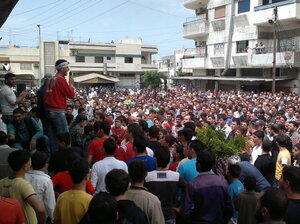 |
| Syrian anti-government protesters demonstrate in Banias on April 29, the "Day of Rage" called by activists to pile pressure on President Bashar Assad as his regime enacted a violent crackdown on dissent. |
If Syria's President Bashar Assad falls, Iran can no longer count on Syria. And among other benefits, the Syrian connection is crucial for Iran's relationship with Hezbollah in Lebanon.
Bruce Riedel, a Middle East analyst at the Brookings Institution's Saban Center, notes that for Iran, it is no longer a simple matter of praising the people in the streets and condemning their rulers.
"If the Syrian government is toppled, in a revolution like Egypt's or Tunisia's, Iran will be the big loser, and the Iranian intelligence services will have lost a key ally in their ability to project power in the Middle East," Riedel says.
Iran's Media Shuts Down Protest Coverage
Iran's news media have gone quiet on Syria, leaving Iranians to rely on satellite TV for coverage of the protests there. As the demonstrations in Syria have spread and hundreds of people have been shot, Iran's leaders have said next to nothing.
Haleh Esfandiari, the director of the Wilson International Center's Middle East program in Washington, says the Iranian leaders are at a loss — they simply cannot take up the cause of the Syrian protesters as they did with earlier Arab demonstrations.
"The best excuse is to blame it not on the grievances of the population but say that these are foreign-instigated uprisings by the Israelis and the Americans," Esfandiari says.
Iran's President Mahmoud Ahmadinejad did just that in a speech a few days ago. He said that the enemy's conspiracy is to spur war between the nations and create Iranian-Arab and Shiite-Sunni tension. All of this is plotted by the United States and its allies, he said.
No comments:
Post a Comment